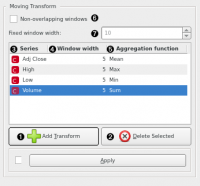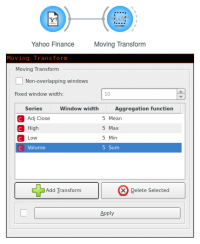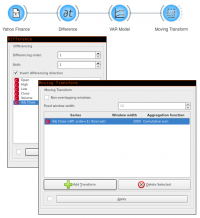Difference between revisions of "Orange: Moving Transform"
Jump to navigation
Jump to search
Onnowpurbo (talk | contribs) |
Onnowpurbo (talk | contribs) |
||
| Line 5: | Line 5: | ||
Apply rolling window functions to the time series. Use this widget to get a series’ mean. | Apply rolling window functions to the time series. Use this widget to get a series’ mean. | ||
| − | + | ==Input== | |
| − | + | Time series: Time series as output by As Timeseries widget. | |
| − | + | ==Output== | |
| − | + | Time series: The input time series with the added series’ transformations. | |
In this widget, you define what aggregation functions to run over the time series and with what window sizes. | In this widget, you define what aggregation functions to run over the time series and with what window sizes. | ||
| Line 17: | Line 17: | ||
[[File:Moving-transform-stamped.png|center|200px|thumb]] | [[File:Moving-transform-stamped.png|center|200px|thumb]] | ||
| − | + | * Define a new transformation. | |
| − | + | * Remove the selected transformation. | |
| − | + | * Time series you want to run the transformation over. | |
| − | + | * Desired window size. | |
| − | + | * Aggregation function to aggregate the values in the window with. Options are: mean, sum, max, min, median, mode, standard deviation, variance, product, linearly-weighted moving average, exponential moving average, harmonic mean, geometric mean, non-zero count, cumulative sum, and cumulative product. | |
| − | + | * Select Non-overlapping windows options if you don’t want the moving windows to overlap but instead be placed side-to-side with zero intersection. | |
| − | + | * In the case of non-overlapping windows, define the fixed window width(overrides and widths set in (4). | |
==Example== | ==Example== | ||
Revision as of 06:22, 30 January 2020
Sumber: https://orange.biolab.si/widget-catalog/time-series/moving_transform/
Apply rolling window functions to the time series. Use this widget to get a series’ mean.
Input
Time series: Time series as output by As Timeseries widget.
Output
Time series: The input time series with the added series’ transformations.
In this widget, you define what aggregation functions to run over the time series and with what window sizes.
- Define a new transformation.
- Remove the selected transformation.
- Time series you want to run the transformation over.
- Desired window size.
- Aggregation function to aggregate the values in the window with. Options are: mean, sum, max, min, median, mode, standard deviation, variance, product, linearly-weighted moving average, exponential moving average, harmonic mean, geometric mean, non-zero count, cumulative sum, and cumulative product.
- Select Non-overlapping windows options if you don’t want the moving windows to overlap but instead be placed side-to-side with zero intersection.
- In the case of non-overlapping windows, define the fixed window width(overrides and widths set in (4).
Example
To get a 5-day moving average, we can use a rolling window with mean aggregation.
To integrate time series’ differences from Difference widget, use Cumulative sum aggregation over a window wide enough to grasp the whole series.


